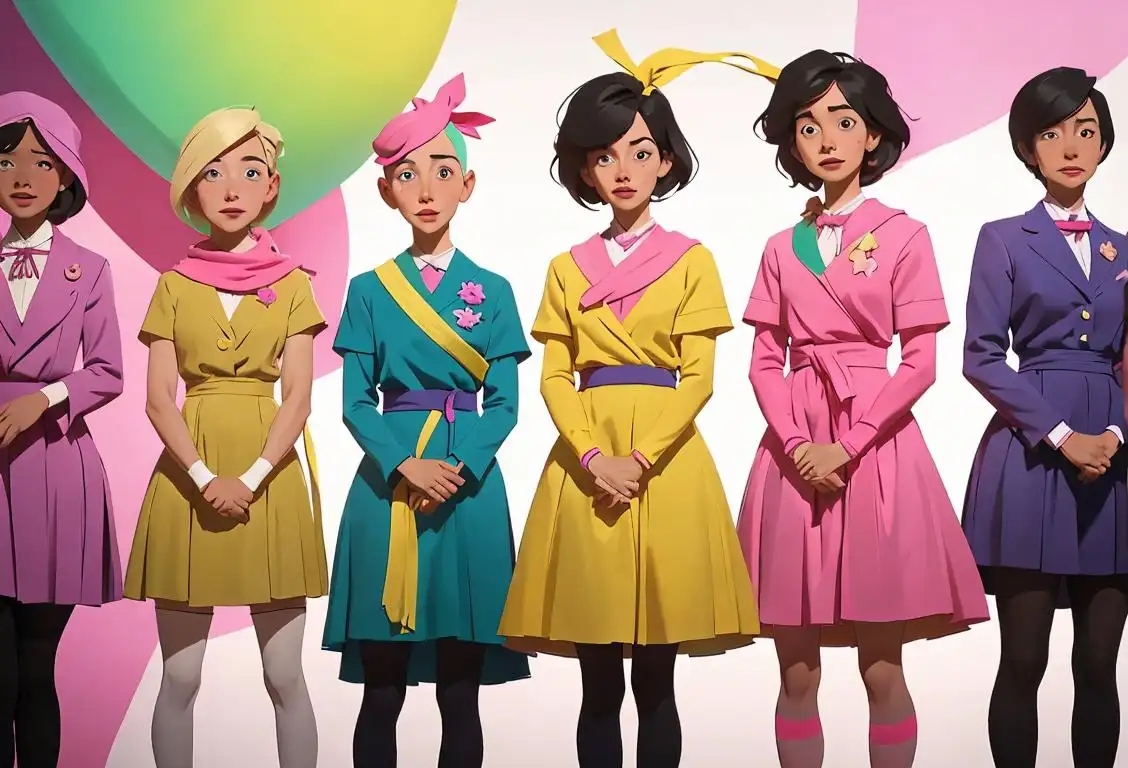National Renewal Day

Happy National Renewal Day! Get ready to refresh, rejuvenate, and revitalize yourself and everything around you. It's the perfect day to hit the reset button and start anew. Whether you're looking to spruce up your home, rejuvenate your relationships, or simply give yourself some self-care, National Renewal Day is here to help you reinvent, recharge, and make some positive changes in your life.
When is Renewal Day?
It's national renewal day on the 4th May.
The Origins of National Renewal Day
While National Renewal Day may not be as old as dinosaurs, it actually has a pretty interesting internet history. The day first began gaining popularity online on May 4, 2015, when it received a whopping 425 mentions. People were buzzing with excitement about the idea of taking a day to focus on rejuvenation and renewal.
Taking Renewal to the Next Level
On National Renewal Day, many people take the opportunity to reflect and assess their life goals and priorities. It's the perfect time to step back and evaluate what's working and what might need a little refresh. Some folks choose to engage in activities that promote self-care, such as practicing mindfulness, going for a rejuvenating spa day, or spending quality time with loved ones.
Others might use this day to clean out their closets, organize their finances, or even start a new hobby. The possibilities are endless! Think of it as a mini New Year's Day, but without the pressure of resolutions that never seem to stick.
A Day of Fun and Renewal
While National Renewal Day is a great opportunity to focus on self-improvement, it's also important to have a little fun along the way. Try incorporating some activities that bring you joy into your day of renewal. Maybe you've always wanted to try painting or rock climbing? Now's the perfect time to explore new hobbies and discover hidden talents.
Did You Know?
Did you know that research has shown that taking regular breaks from work and engaging in activities that bring you joy can actually increase productivity? So, don't feel guilty about taking a break and doing something fun on National Renewal Day. You might just find that it boosts your overall well-being and makes you more efficient in the long run.
History behind the term 'Renewal'
12th century
Emergence as a term in Middle English
In the 12th century, the term 'renewal' emerged in Middle English. It derived from the Old French word 'renoveler' and ultimately from the Latin word 'renovare,' which means 'to make new again.' Initially, it was used primarily in religious contexts, referring to the restoration or revival of spiritual life and devotion.
12th century
Origins in Latin
The term 'renewal' finds its origins in the Latin word 'renovare,' which means 'to make new again.' The concept of renewal was deeply rooted in the spiritual and religious practices of the 12th century, emphasizing the revitalization and rejuvenation of faith and devotion.
14th century
Origins of the term
The term 'renewal' has its origins in the 14th century, derived from the Middle English word 'renovacion' which meant 'restoration' or 'resumption'. It was used to describe the process of making something new again or bringing something back to its original state.
14th century
Expansion into secular contexts
During the 14th century, the term 'renewal' started to expand beyond religious contexts and into secular areas. It began to be used to describe the act of restoring or refreshing something to its original or proper state. This extension of the term highlighted the idea of bringing new life, energy, or vitality to various aspects of society, such as laws, traditions, or institutions.
18th century
Development of religious connotations
During the 18th century, the term 'renewal' started to gain religious connotations. It was often used to describe spiritual or religious rebirth, emphasizing the idea of personal transformation and the renewal of faith. This usage became particularly prominent during religious revivals of the time.
14th century
Expanding to cultural aspects
During the 14th century, the term 'renewal' extended its reach beyond religious connotations and broadened its application to various cultural aspects. It began to signify the revival and revitalization of artistic, literary, and philosophical movements, giving birth to notions such as 'Renaissance,' a period of great artistic and intellectual renewal.
17th century
Emergence in legal context
In the 17th century, the term 'renewal' gained significance in legal contexts. It became associated with the extension or continuation of contracts, leases, or agreements, emphasizing the act of restoring or refreshing legal obligations for ongoing terms.
19th century
Expansion into societal context
In the 19th century, the concept of renewal expanded beyond religious contexts and entered societal discourse. The term started to be used to describe the revitalization or reformation of social, political, and cultural systems. It became associated with movements and reforms that aimed to create positive change and improvement in various aspects of society.
19th century
Rise of the Renewal Movements
In the 19th century, the concept of renewal gained significant cultural and social prominence with the emergence of various renewal movements. These movements aimed to reform and rejuvenate different spheres of life, including politics, education, arts, and spirituality. The notion of renewal became associated with progress, innovation, and the pursuit of a better future.
20th century
Renewal in environmental awareness
During the 20th century, there was a growing global awareness of environmental issues, leading to the emergence of the environmental movement. The term 'renewal' became closely associated with ideas of sustainable development, conservation, and the restoration of nature. It highlighted the urgent need to preserve and renew natural resources for future generations.
18th century
Industrial Revolution and urban renewal
The 18th century witnessed the Industrial Revolution, which led to widespread urbanization. This era saw the emergence of the term 'renewal' in relation to urban revitalization and redevelopment. The concept of urban renewal emphasized the renovation and improvement of cities to adapt to the expanding industrial landscape.
20th century
Renewal in environmental and sustainable contexts
During the 20th century, the term 'renewal' found new relevance in the context of environmental and sustainable practices. As concerns over environmental degradation grew, the concept of renewal became closely tied to the idea of preserving and restoring natural resources. It came to signify the importance of sustainable development, renewable energy sources, and conservation efforts to ensure a healthier planet for future generations.
21st century
Personal and self-improvement focus
In the 21st century, 'renewal' has taken on a more individualized connotation, particularly in the realm of personal development. It is often associated with self-care, well-being, and the pursuit of personal growth and resilience. The term is frequently used in contexts related to wellness practices, mindfulness, and the intentional revitalization of one's physical, mental, and emotional state.
20th century
Environmental and personal renewal
In the 20th century, the term 'renewal' took on a broader significance, extending to environmental and personal realms. It became associated with the conservation and sustainable use of natural resources, highlighting the importance of environmental renewal. Additionally, 'renewal' gained popularity in self-help and personal development literature, symbolizing the rejuvenation of individuals' physical, mental, and emotional well-being.
21st century
Renewal in personal growth and wellness
In the 21st century, the concept of renewal has extended to personal growth and wellness. It is often used to describe practices and activities that promote self-improvement, self-care, and rejuvenation. The emphasis is on renewal of the mind, body, and spirit, aiming to enhance overall well-being and achieve a balanced and fulfilled life.
Did you know?
Did you know that research has shown that taking regular breaks from work and engaging in activities that bring you joy can actually increase productivity?Tagged
romance fun loved ones financeFirst identified
4th May 2015Most mentioned on
4th May 2015Total mentions
425Other days
Believe Day
Awareness Day
Opposite Day
Family Day
Action Day
One Day
Happiness Day
Suicide Prevention Month Day
Seniors Day
Cancer Awareness Day









